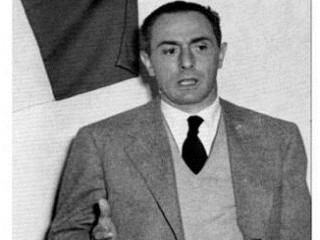
Enrico Mattei biography
Date of birth : 1906-04-29
Date of death : 1962-10-27
Birthplace : Acqualagna, Italy
Nationality : Italian
Category : Famous Figures
Last modified : 2011-04-06
Credited as : Entrepreneur, public administrator, ENI
Enrico Mattei was the most acclaimed entrepreneur in Italy after World War II. A small industrialist before the war and a leading anti-fascist partisan during the war, Mattei in the 1950s created one of the largest public industrial conglomerates in Italy.
Mattei was born in Acqualagna (Pesaro), a small, non-descript village in which a leather processing plant was the main employer and the only manufacturing activity. As a young man he was a high school dropout but did well as a blue collar worker. By the age of 20 he became the director of the only plant in the village. When the plant had to be liquidated, he moved to the big city—Milan—where at first he acted as a sales representative for German chemical firms. Eventually, he opened his own small chemical plant, which in spite of the 1930s depression had a tremendous financial success. By 1936, at the age of 30, Mattei, a prosperous Italian small industrialist, married an Austrian actress with whom he lived despite his frequent infidelities.
The first two years of World War II confounded Mattei, and he seemed incapable of any action. Mattei studied accounting and learned social philosophy from Boldrini, a professor living in the same housing complex and a native of the same village.
By 1943, when the Allies invaded Italy, Mattei became an active anti-fascist partisan. At the time, the partisan movement was controlled by Communists and Socialists. Mattei believed in a Christian socialist philosophy and felt that it was necessary that the non-Marxists take part in the anti-fascist struggle in order to have a voice after the war. He therefore initiated a mobilization of the clergy and that part of the middle class that were anti-fascist but afraid of a Socialist and Communist takeover. This was a difficult task, but Mattei succeeded by leading and organizing anti-government and anti-Nazi activities on the part of the "Christian Democrats." Eventually he became the financial coordinator and spokesman for a large group of partisans. He succeeded in gaining respect for his integrity and organizational skills.
At the end of the war, as a payoff for his contribution to the Christian Democrat Party, the new coalition government appointed Mattei as a special commissary for AGIP, the Italian Petroleum Agency, a public company created in the 1930s for the research and development of petroleum. The charge was to liquidate the agency by closing drilling sites and selling the assets to private interests.
Enrico Mattei did not believe in defeat and had strong nationalist feelings. Instead of liquidation, he began secretly to expand AGIP's activities. By perseverence and luck he found important reserves of natural gas in northern Italy. He distributed the gas to industrial plants by building a large pipeline network. This, among other things, contributed to the expansion of the steel industry, which had been stagnating at that time.
The multinational oil companies did not appreciate Mattei's activities and through the United States government put pressure on the Italian government to cease and desist oil and gas operations. But Mattei, by subterfuge, even when removed from the leadership of AGIP, continued expansion. When a little oil was found in the Po Valley, the government tacitly went along with Mattei's ventures and in 1953 created the ENI, the Natural Hydrocarbons Agency, a financial body meant to incorporate all government operations in the field. Inevitably, Mattei took charge. In Italy within ten years ENI expanded in oil and gas related fields such as exploration, refining, oil and gas pipes, distribution networks, oil drilling equipment, and petrochemicals. It also entered such fields as motels, textiles, and even newspapers.
To the dismay and displeasure of the Seven Sisters (the principal oil multinationals), Mattei expanded his operations also into the Middle East and Africa. The diplomatic pressure brought on the Italian government was to no avail because Mattei through his intrigues and control of the 50 or so companies under the ENI umbrella could not be stopped without grave political repercussions.
When Mattei died in a plane accident in 1962, at the age of 56, he left a legacy in Italy never matched by private or public entrepreneurs. As a political man—he was a deputy in parliament between 1948 and 1953—he used his position to enhance the economic goals of the mammoth enterprise. In his private life, he was easily persuaded by women; he tried to be a caring husband but spent little time at home. Enrico Mattei was always on the move, in search of new horizons. While some attribute his death to foul play by those he had antagonized, this theory was never proven.
















